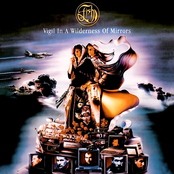Vigil in a Wilderness of Mirrors

Biography
Vigil in a Wilderness of Mirrors (1990) was the first solo album that rock singer Fish released after he departed Marillion in 1988. Although the recordings for this album finished as early as June 1989, EMI Records decided to delay the release until early 1990, to avoid collision with Marillion's album Seasons End (September 1989). However, the track State of Mind was released as a single as early as 16 October 1989, more than three months ahead of the album. Further singles from the album wer...
Vigil in a Wilderness of Mirrors (1990) was the first solo album that rock singer Fish released after he departed Marillion in 1988. Although the recordings for this album finished as early as June 1989, EMI Records decided to delay the release until early 1990, to avoid collision with Marillion's album Seasons End (September 1989). However, the track State of Mind was released as a single as early as 16 October 1989, more than three months ahead of the album. Further singles from the album were Big Wedge (the actual lead single, 27 December 1989), A Gentleman's Excuse Me (5 March 1990) and The Company (18 July 1990, only released in Germany). Contents The only Fish album to be released by EMI (see below), it was also his most commercially successful. In February 1990, the album peaked at number 5 in the UK Albums Chart, with the singles reaching no. 32 (State of Mind, October 1989), no. 25 (Big Wedge, January 1990) and no. 30 (Gentleman's Excuse Me, March 1990) on the UK Singles Chart. The cover art was by Mark Wilkinson, who had illustrated all Marillion albums and singles while Fish was their singer and went on to design almost all Fish solo covers. The front cover features a close-up from a larger, very detailed painting/collage inside the gatefold LP cover and the CD booklet. The painting contains many references to the lyrics, political allusions as well as "hidden" messages only understandable to fans (such as the faces of Marillion's keyboarder Mark Kelly and manager John Arnison). The central element is a "hill" consisting of junk consumer goods in a post-apocalyptic landscape, on top of which a couple clad in pseudo-oriental clothes stare into the distance, holding an hourglass. The man's cape, flapping in the wind, resembles the east of Scotland, with the Southern Uplands (Fish's home region) lit by light beams apparently emitted by the hourglass – a reference to Fish's interest in Scottish culture. Only the couple and the top of the hill are on the front cover. The TV sets the couple is standing on show pictures of Fish's face; on the larger version inside, these are replaced with faces from Ingres's painting The Golden Age. The album is not a concept album, however, several of the songs refer to "the hill" – a metaphor for greed and consumerism. The songs deal with the themes that Fish has always been passionate about – personal and social politics – but in single-song format. State of Mind and Big Wedge stand out as the most overtly political songs: State of Mind strongly articulates the growing civic disillusionment in the late Thatcher years, Big Wedge is an explicit criticism of capitalist greed, American society and policies (the cover of the single features Uncle Sam offering a wedge of dollar bills to the viewer). Incidentally, the lyric had earlier been vetoed by Marillion as "anti-American", they feared it might have hampered their entry into the U.S. market with the next album. Other songs express a more general disgust with materialism (Vigil, The Company, View From The Hill). Family Business refers to domestic violence, the bonus track The Voyeur (I Like To Watch) to TV voyeurism. Finally, A Gentleman's Excuse Me and Cliché are love songs. The phrase "wilderness of mirrors" is originally from T. S. Eliot's poem Gerontion, but has since become a widely used metaphor for disinformation in spy fiction, where Fish picked it up. The album covers a variety of musical styles, including progressive rock (Vigil), pop rock (Big Wedge), hard rock (View From The Hill), and folk music (The Company). As he is a lyricist and not a musical composer, Fish collaborated with keyboarder Mickey Simmonds in writing all songs except View From The Hill, which was co-written and recorded with current Iron Maiden guitarist Janick Gers. Ex-Dire Straits guitarist Hal Lindes contributed to the writing of State of Mind, Family Business and Cliché. He also played guitar on most tracks, along with Frank Usher, a Fish companion from pre-Marillion times. Drums were handled by Mark Brzezicki (of Big Country), John Keeble (of Spandau Ballet, State of Mind only), bass by John Giblin, additional percussion by Luis Jardim, backing vocals by Tessa Niles and Carol Kenyon. Apart from these, there are performances on individual songs by The Kick Horns (brass instruments on Big Wedge), Davy Spillane (pipes and tin whistle on Vigil), Phil Cunningham) (tin whistle, bodhran, accordion on The Company, Internal Exile), Aly Bain (violin on The Company, Internal Exile) and Gavyn Wright (credited as Gavin Wright, violin on The Company, orchestral arrangement on A Gentleman's Excuse Me, which was recorded with a 23-piece orchestra at Abbey Road Studios). The album was recorded at Townhouse Studios, London, during the first half of 1989, and produced by Jon Kelly. Read more on Last.fm. User-contributed text is available under the Creative Commons By-SA License; additional terms may apply.




